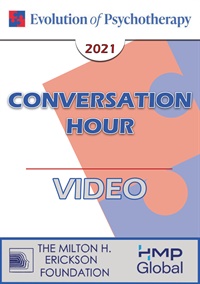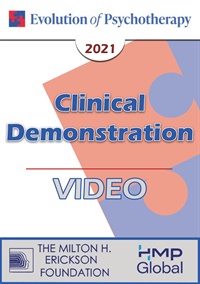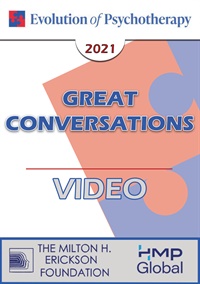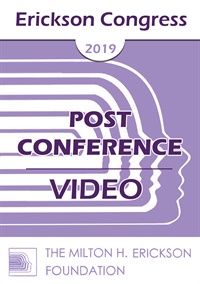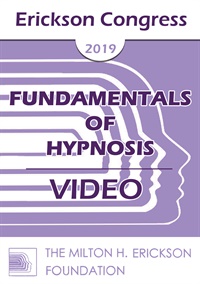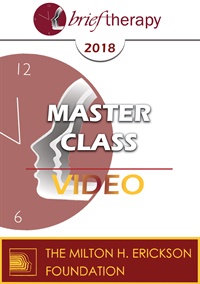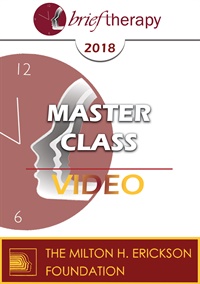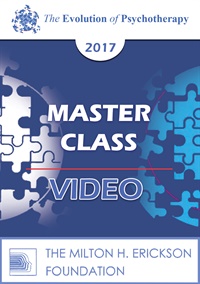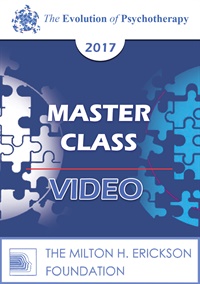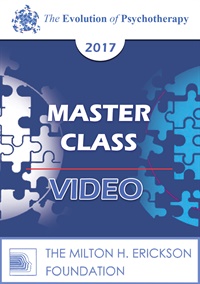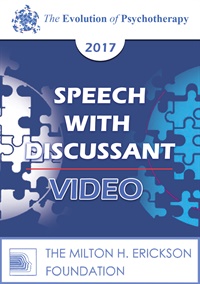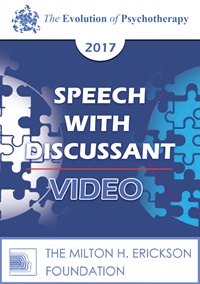- Average Rating:
- Not yet rated
- Topic Areas:
- Conversation Hours | History of Psychotherapy | Psychotherapy
- Categories:
- Evolution of Psychotherapy | Evolution of Psychotherapy 2021
- Faculty:
- Jeffrey Zeig, PhD
- Course Levels:
- Master Degree or Higher in Health-Related Field
- Duration:
- 1 hour
- Format:
- Audio and Video
- Original Program Date:
- Dec 04, 2021
- Short Description:
- Dr Zeig will discuss and answer questions about some of the psychotherapy masters he has encountered, including Viktor Frankl, Milton Erickson and Virginia Satir.
- Price:
- $59.00 - Base Price
- Average Rating:
- Not yet rated
- Topic Areas:
- Clinical Demonstrations | Experiential Therapy | Psychotherapy
- Categories:
- Evolution of Psychotherapy | Evolution of Psychotherapy 2021
- Faculty:
- Jeffrey Zeig, PhD
- Course Levels:
- Master Degree or Higher in Health-Related Field
- Duration:
- 1 hour
- Format:
- Audio and Video
- Original Program Date:
- Dec 03, 2021
- Short Description:
- Hypnotic psychotherapy uses both formal trance and methods derived from hypnosis.
- Price:
- $59.00 - Base Price
- Average Rating:
- Not yet rated
- Topic Areas:
- Addiction | Great Conversations
- Categories:
- Evolution of Psychotherapy | Evolution of Psychotherapy 2021
- Faculty:
- Jeffrey Zeig, PhD | Gabor Maté
- Course Levels:
- Master Degree or Higher in Health-Related Field
- Duration:
- 1 hour
- Format:
- Audio and Video
- Original Program Date:
- Dec 01, 2021
- Short Description:
- Great Conversation on the topic of Addiction from the 2021 Evolution of Psychotherapy Conference. Featuring Jeffrey Zeig and Gabor Maté.
- Price:
- $59.00 - Base Price
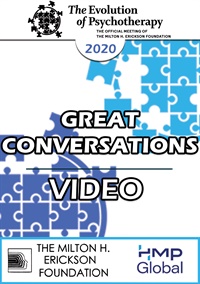
- Average Rating:
- Not yet rated
- Topic Areas:
- Gestalt | Great Conversations | Ericksonian Hypnosis and Therapy Techniques | Experiential Therapy | Psychotherapy | Art and Creativity
- Categories:
- Evolution of Psychotherapy | Evolution of Psychotherapy 2020
- Faculty:
- Erving Polster, PhD | Jeffrey Zeig, PhD
- Course Levels:
- Master Degree or Higher in Health-Related Field
- Duration:
- 1 hour
- Format:
- Audio and Video
- Original Program Date:
- Dec 11, 2020
- Short Description:
- Poetry and Presence: Each can lead to client change. This session explores the intersection of two experiential methods, gestalt practice and Ericksonian therapy.
- Price:
-
Sale is $29.00
price reduced from Base Price - $59.00
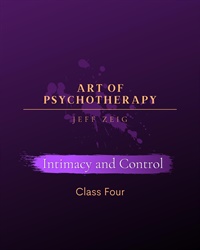
- Average Rating:
- Not yet rated
- Topic Areas:
- Utilization | Clinical Demonstrations | Psychotherapy | Therapist Development | Intimacy | Psychosomatics | Communication
- Bundle(s):
- Art of Psychotherapy - Utilization Series
- Categories:
- Art of Psychotherapy
- Faculty:
- Jeffrey Zeig, PhD
- Course Levels:
- Master Degree or Higher in Health-Related Field
- Duration:
- 2 Hours 22 Minutes
- Format:
- Audio and Video
- Original Program Date:
- Jul 12, 2020
- Short Description:
- For the final class in the Utilization series, Patricia joins us to discuss her preference for being in control, and how that relates to her struggles with intimacy. She also requests help alleviating a psychosomatic response from an earlier trauma. Dr. Zeig uses an interpersonal approach to this session, utilizing verbal and body language techniques to help communicate complex concepts. Zeig establishes the theme of appreciate as the through-line for this session.
- Price:
- $79.00 - Base Price
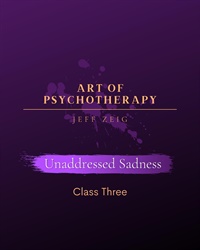
- Average Rating:
- Not yet rated
- Topic Areas:
- Utilization | Clinical Demonstrations | Psychotherapy | Therapist Development | Age Regression | Language of Hypnosis | Therapeutic Relationship
- Bundle(s):
- Art of Psychotherapy - Utilization Series
- Categories:
- Art of Psychotherapy
- Faculty:
- Jeffrey Zeig, PhD
- Course Levels:
- Master Degree or Higher in Health-Related Field
- Duration:
- 2 Hours 15 Minutes
- Format:
- Audio and Video
- Original Program Date:
- Jul 05, 2020
- Short Description:
- Our demonstration subject for session three has two presenting issues - an undercurrent of sadness that seems to be everpresent, and a difficulty communicating about financial situations in her life. Dr. Zeig starts off the session by speaking Spanish, Karina’s native language. This simple technique puts Karina quickly at ease and sets the tone for the session. By inducing a hypnotic state Dr Zeig is able to do a quick age regression, and through utilizing a number of linguistic techniques - recursion, speaking in triplicate, altering tempo and tone of voice - he was able to seed therapeutic goals and create motivation for change.
- Price:
- $79.00 - Base Price

- Average Rating:
- Not yet rated
- Topic Areas:
- Utilization | Clinical Demonstrations | Psychotherapy | Therapist Development | Children and Adolescent Therapy | Interviewing | Relationships | Therapeutic Relationship
- Bundle(s):
- Art of Psychotherapy - Utilization Series
- Categories:
- Art of Psychotherapy
- Faculty:
- Jeffrey Zeig, PhD
- Course Levels:
- Master Degree or Higher in Health-Related Field
- Duration:
- 2 Hours 18 Minutes
- Format:
- Audio and Video
- Original Program Date:
- Jun 28, 2020
- Short Description:
- Demonstration subject Mette is struggling with issues trying to feel an emotional connection to her children. She describes her difficulty with being present for her children, and is looking for guidance. Dr. Zeig exhibits a few simple techniques that help create a powerful therapeutic relationship quickly, through the use of gestures and strategic interview questions. Dr. Zeig is able to utilize this information to create useful suggestions to help Mette with her situation.
- Price:
- $79.00 - Base Price
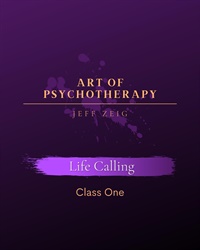
- Average Rating:
- Not yet rated
- Topic Areas:
- Utilization | Clinical Demonstrations | Psychotherapy | Therapist Development | Anxiety | Ericksonian Hypnosis and Therapy Techniques | Religion | Art of Psychotherapy
- Bundle(s):
- Art of Psychotherapy - Utilization Series
- Categories:
- Art of Psychotherapy
- Faculty:
- Jeffrey Zeig, PhD
- Course Levels:
- Master Degree or Higher in Health-Related Field
- Duration:
- 2 Hours 22 Minutes
- Format:
- Audio and Video
- Original Program Date:
- Jun 21, 2020
- Short Description:
- In our first session, our demonstration subject has recently made a major life change. They have decided to change their career from being a priest, into becoming a therapist. Big life changes like these often induce anxiety in patients, and in this clinical demonstration we see Dr. Jeffrey Zeig exhibit a number of Ericksonian techniques to help the client be in harmony with themselves. Dr. Zeig utilizes some of Ginny’s religious history to help guide her towards transformation.
- Price:
- $79.00 - Base Price
- Average Rating:
- Not yet rated
- Topic Areas:
- Master Classes | Ericksonian Psychotherapy | Psychotherapy | Brief Therapy | Hypnotherapy | Self-Relations | Utilization
- Categories:
- Erickson Congress | Erickson Congress 2019
- Faculty:
- Bill O'Hanlon, MS | Jeffrey Zeig, PhD
- Course Levels:
- Master Degree or Higher in Health-Related Field
- Duration:
- 4 Hours 49 Minutes
- Format:
- Audio and Video
- Original Program Date:
- Dec 16, 2019
- Short Description:
- Ericksonian hypnotherapy and the Self-Relations approach are experiential methods of change. In combination they can be synergistic. Psychotherapy is best when clients have a first-hand experience of an alive therapeutic process. Such dynamic empowering experiences pave the way for dynamic understandings. Bill O’Hanlon and Jeffrey Zeig will engage with each other and the participants to examine commonalities and differences in their work.
- Price:
- $59.00 - Base Price
- Average Rating:
- Not yet rated
- Topic Areas:
- Fundamentals of Hypnosis | Hypnotic Induction | Utilization | Hypnosis
- Categories:
- Erickson Congress | Erickson Congress 2019
- Faculty:
- Jeffrey Zeig, PhD
- Course Levels:
- Master Degree or Higher in Health-Related Field
- Duration:
- 1 Hour 47 Minutes
- Format:
- Audio and Video
- Original Program Date:
- Dec 13, 2019
- Short Description:
- An Ericksonian induction structure will be presented and demonstrated. Utilization, a foundation of Ericksonian hypnosis and psychotherapy, will be incorporated and demonstrated. Practice sessions are included.
- Price:
-
Sale is $29.00
price reduced from Base Price - $59.00
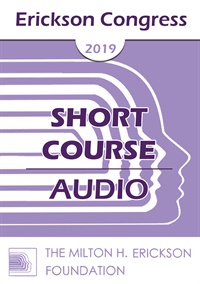
- Average Rating:
- Not yet rated
- Topic Areas:
- Short Courses | Experiential Therapy | Psychotherapy | Therapist Development
- Categories:
- Erickson Congress | Erickson Congress 2019
- Faculty:
- Robert Staffin, PsyD, ABPH
- Duration:
- 1 Hour 30 Minutes
- Format:
- Audio Only
- Original Program Date:
- Dec 12, 2019
- Short Description:
- Often, being dubbed a "master" means that what the teacher does cannot be done by others. However, a cornerstone of Jeffrey Zeig's lifelong quest has been to demystify, annotate, and democratize Milton H. Erickson's work and then his own. In this session, the presenter will map the breadth and scope of Zeig's work, which he has augmented by integrating a theoretical and experimental corpus with the most effective practices of the arts: film, music, theater, literature, and dance.
- Price:
- $15.00 - Base Price
- Average Rating:
- Not yet rated
- Topic Areas:
- Master Classes | Hypnosis | Psychotherapy | Ericksonian Hypnosis and Therapy Techniques | Ericksonian Psychotherapy | Experiential Therapy | Hypnotherapy
- Categories:
- Brief Therapy Conference | Brief Therapy Conference 2018
- Faculty:
- Michael Yapko, PhD | Jeffrey Zeig, PhD
- Course Levels:
- Master Degree or Higher in Health-Related Field
- Duration:
- 2:43:33
- Format:
- Audio and Video
- Original Program Date:
- Dec 10, 2018
- Short Description:
- This session explores how hypnosis and strategic therapy can help clients untangle patterns of avoidance, self-doubt, and family tension. By using affective dissociation, metaphors, and experiential learning, the master class demonstrates how to separate mood from action, strengthen integrity with self, and foster resilience. Participants gain insight into how language, stories, and relational dynamics can be woven into therapy to create lasting change.
- Price:
-
Sale is $29.00
price reduced from Base Price - $59.00
- Average Rating:
- Not yet rated
- Topic Areas:
- Master Classes | Hypnosis | Psychotherapy | Ericksonian Hypnosis and Therapy Techniques | Strategic Therapy | Ericksonian Psychotherapy | Experiential Therapy | Hypnotherapy
- Categories:
- Brief Therapy Conference | Brief Therapy Conference 2018
- Faculty:
- Michael Yapko, PhD | Jeffrey Zeig, PhD
- Course Levels:
- Master Degree or Higher in Health-Related Field
- Duration:
- 2:56:13
- Format:
- Audio and Video
- Original Program Date:
- Dec 10, 2018
- Short Description:
- In this interactive master class, live demonstrations show how hypnosis and experiential methods can help clients transform fear into resilience. One volunteer confronts a lifelong fear of deep water, discovering a powerful inner resource through imagery of her father’s love. Another works through the emotional aftermath of divorce, learning new ways to disarm old patterns of intimidation. The session highlights how metaphor, experiential sculpting, and hypnotic reframing can unlock unexpected pathways to strength and healing.
- Price:
-
Sale is $29.00
price reduced from Base Price - $59.00
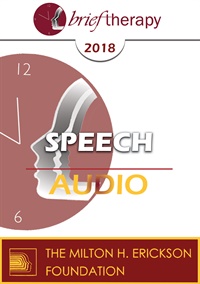
- Average Rating:
- Not yet rated
- Topic Areas:
- Speeches | Brief Therapy | Ericksonian Hypnosis and Therapy Techniques | Therapist Development
- Categories:
- Brief Therapy Conference | Brief Therapy Conference 2018
- Faculty:
- Jeffrey Zeig, PhD
- Duration:
- 1:00:38
- Format:
- Audio Only
- Original Program Date:
- Dec 09, 2018
- Short Description:
- One way of modeling Milton Erickson is to consider the states that he commonly inhabited when he was conducting psychotherapy. Erickson "states" will be described and examples will be provided.
- Price:
- $15.00 - Base Price
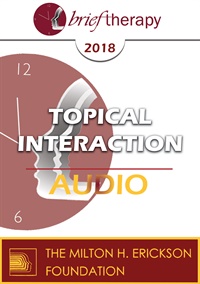
- Average Rating:
- Not yet rated
- Topic Areas:
- Topical Interactions | Brief Therapy | Milton Erickson
- Categories:
- Brief Therapy Conference | Brief Therapy Conference 2018
- Faculty:
- Jeffrey Zeig, PhD
- Duration:
- 57:25
- Format:
- Audio Only
- Original Program Date:
- Dec 08, 2018
- Short Description:
- Describe and exemplify essentials of Milton Erickson's approach to Brief Therapy.
- Price:
- $15.00 - Base Price
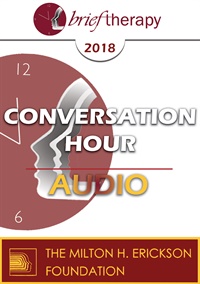
- Average Rating:
- Not yet rated
- Topic Areas:
- Great Conversations | Habits | Brief Therapy | Treatment Planning
- Categories:
- Brief Therapy Conference | Brief Therapy Conference 2018
- Faculty:
- David Burns, MD | Jeffrey Zeig, PhD
- Duration:
- 56:53
- Format:
- Audio Only
- Original Program Date:
- Dec 08, 2018
- Short Description:
- The mechanics of assessment and treatment planning for working with habits and addictions including relevant research findings.
- Price:
- $15.00 - Base Price
Credit available - Click Here for more information
- Average Rating:
- Not yet rated
- Topic Areas:
- Clinical Demonstrations | Psychotherapy | Brief Therapy | Evocative Communication
- Categories:
- Brief Therapy Conference | Brief Therapy Conference 2018 | Online Continuing Education
- Faculty:
- Jeffrey Zeig, PhD
- Course Levels:
- Master Degree or Higher in Health-Related Field
- Duration:
- 58:06
- Format:
- Audio and Video
- Original Program Date:
- Dec 08, 2018
- Short Description:
- The clinical demonstration is evocative psychotherapy.
- Price:
-
Sale is $29.00
price reduced from Base Price - $59.00
Credit available - Click Here for more information
- Average Rating:
- Not yet rated
- Topic Areas:
- Workshops | Brief Therapy | Evocative Communication | Metaphors | Strategic Therapy | Utilization | Psychotherapy
- Categories:
- Brief Therapy Conference | Brief Therapy Conference 2018 | Online Continuing Education
- Faculty:
- Jeffrey Zeig, PhD
- Course Levels:
- Master Degree or Higher in Health-Related Field
- Duration:
- 1:45:53
- Format:
- Audio and Video
- Original Program Date:
- Dec 07, 2018
- Short Description:
- Three evocative orientations to psychotherapy, utilization, using metaphor, and strategic development, will be explained, demonstrated and practiced. There are components to each of these methods that will be addressed.
- Price:
-
Sale is $29.00
price reduced from Base Price - $59.00
Credit available - Click Here for more information
- Average Rating:
- Not yet rated
- Topic Areas:
- Master Classes | Experiential Therapy | Gestalt | Hypnosis | Psychotherapy
- Categories:
- Evolution of Psychotherapy | Evolution of Psychotherapy 2017 | Online Continuing Education
- Faculty:
- Jeffrey Zeig, PhD | Erving Polster, PhD
- Course Levels:
- Master Degree or Higher in Health-Related Field
- Duration:
- 2:33:42
- Format:
- Audio and Video
- Original Program Date:
- Dec 18, 2017
- Short Description:
- Part 3 of 3. Gestalt therapy and Ericksonian hypnotherapy are experiential methods of change. In combination they can be synergistic. Psychotherapy is best when clients have a first-hand experience of an alive therapeutic process. Such dynamic empowering experiences pave the way for dynamic understandings. Drs. Polster and Zeig will engage with each other and the participants to examine commonalities and differences in their work.
- Price:
-
Sale is $29.00
price reduced from Base Price - $59.00
Credit available - Click Here for more information
- Average Rating:
- Not yet rated
- Topic Areas:
- Master Classes | Psychotherapy | Experiential Therapy | Gestalt | Hypnosis
- Bundle(s):
- Learning Track - EP17 Erickson Stream | Learning Track - EP17 Psychotherapy Stream
- Categories:
- Evolution of Psychotherapy | Evolution of Psychotherapy 2017 | Evolution of Psychotherapy Erickson Learning Track | Evolution of Psychotherapy Psychotherapy Learning Track | Online Continuing Education
- Faculty:
- Erving Polster, PhD | Jeffrey Zeig, PhD
- Course Levels:
- Master Degree or Higher in Health-Related Field
- Duration:
- 1:17:56
- Format:
- Audio and Video
- Original Program Date:
- Dec 18, 2017
- Short Description:
- Part 2 of 3. Gestalt therapy and Ericksonian hypnotherapy are experiential methods of change. In combination they can be synergistic. Psychotherapy is best when clients have a first-hand experience of an alive therapeutic process. Such dynamic empowering experiences pave the way for dynamic understandings. Drs. Polster and Zeig will engage with each other and the participants to examine commonalities and differences in their work.
- Price:
-
Sale is $29.00
price reduced from Base Price - $59.00
Credit available - Click Here for more information
- Average Rating:
- Not yet rated
- Topic Areas:
- Master Classes | Psychotherapy | Experiential Therapy | Gestalt | Hypnosis
- Bundle(s):
- Learning Track - EP17 Erickson Stream | Learning Track - EP17 Psychotherapy Stream
- Categories:
- Evolution of Psychotherapy | Evolution of Psychotherapy 2017 | Evolution of Psychotherapy Erickson Learning Track | Evolution of Psychotherapy Psychotherapy Learning Track | Online Continuing Education
- Faculty:
- Erving Polster, PhD | Jeffrey Zeig, PhD
- Course Levels:
- Master Degree or Higher in Health-Related Field
- Duration:
- 1:24:19
- Format:
- Audio and Video
- Original Program Date:
- Dec 18, 2017
- Short Description:
- Part 1 of 3. Gestalt therapy and Ericksonian hypnotherapy are experiential methods of change. In combination they can be synergistic. Psychotherapy is best when clients have a first-hand experience of an alive therapeutic process. Such dynamic empowering experiences pave the way for dynamic understandings. Drs. Polster and Zeig will engage with each other and the participants to examine commonalities and differences in their work.
- Price:
-
Sale is $29.00
price reduced from Base Price - $59.00
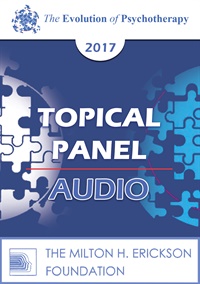
- Average Rating:
- Not yet rated
- Topic Areas:
- Topical Panels | Goals of the Therapist | Therapist Development | Psychotherapy
- Categories:
- Evolution of Psychotherapy | Evolution of Psychotherapy 2017
- Faculty:
- Esther Perel, MA, LMFT | Bessel van der Kolk, MD | Jeffrey Zeig, PhD
- Duration:
- 56:35
- Format:
- Audio Only
- Original Program Date:
- Dec 16, 2017
- Short Description:
- The process of contracting for change in the initial session will be described and discussed. Methods of targeting goals will be compared and contrasted.
- Price:
- $15.00 - Base Price
Credit available - Click Here for more information
- Average Rating:
- Not yet rated
- Topic Areas:
- Speeches with Discussants | Couples Therapy | Family Therapy | Psychotherapy
- Categories:
- Evolution of Psychotherapy | Evolution of Psychotherapy 2017 | Online Continuing Education
- Faculty:
- John Gottman, PhD | Bill Bumberry, PhD | Jeffrey Zeig, PhD
- Course Levels:
- Master Degree or Higher in Health-Related Field
- Duration:
- 1:30:24
- Format:
- Audio and Video
- Original Program Date:
- Dec 16, 2017
- Short Description:
- It has been 50 years since General Systems Theory revolutionized psychotherapy. Yet it never became a real science, and the therapies it produced were either never evaluated or, when studied, produced only weak effects. We can now scientifically complete general systems theory and show that the new theory does result in highly effective couples and family therapy.
- Price:
-
Sale is $29.00
price reduced from Base Price - $59.00
- Average Rating:
- Not yet rated
- Topic Areas:
- Speeches with Discussants | Cognitive Behavior Therapy (CBT) | Anxiety | Depression | Psychotherapy | Therapist Development
- Categories:
- Evolution of Psychotherapy | Evolution of Psychotherapy 2017 | Evolution of Psychotherapy CBT Learning Track
- Faculty:
- David Burns, MD | Jeffrey Zeig, PhD
- Course Levels:
- Master Degree or Higher in Health-Related Field
- Duration:
- 1:19:51
- Format:
- Audio and Video
- Original Program Date:
- Dec 16, 2017
- Short Description:
- Although there's been an overwhelming proliferation of new therapies for depression and anxiety, the controlled outcome studies have yielded disappointing results. Dr. Burns argues that this is because resistance has not been addressed, and describes a new approach called TEAM-CBT that solves this problem and promises superior outcomes.
- Price:
-
Sale is $29.00
price reduced from Base Price - $59.00
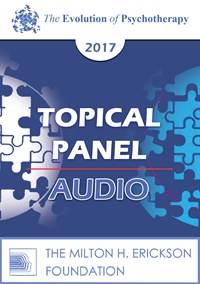
- Average Rating:
- Not yet rated
- Topic Areas:
- Topical Panels | Psychotherapy | Experiential Therapy | Therapist Development | Training
- Bundle(s):
- Learning Track - EP17 Psychotherapy Download
- Categories:
- Evolution of Psychotherapy | Evolution of Psychotherapy 2017 | Evolution of Psychotherapy Psychotherapy Learning Track
- Faculty:
- Donald Meichenbaum, PhD | Jeffrey Zeig, PhD | Scott Miller, PhD
- Duration:
- 1:01:43
- Format:
- Audio Only
- Original Program Date:
- Dec 15, 2017
- Short Description:
- Psychotherapists can be trained through didactic, research-based, and experiential approaches. These approaches will be compared and contrasted.
- Price:
- $15.00 - Base Price


